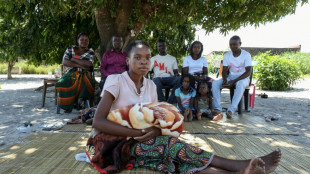
-
 'I wanted to die': survivors recount Mozambique flood terror
'I wanted to die': survivors recount Mozambique flood terror
-
Trump issues fierce warning to Minneapolis mayor over immigration

-
 Anglican church's first female leader confirmed at London service
Anglican church's first female leader confirmed at London service
-
Germany cuts growth forecast as recovery slower than hoped

-
 Amazon to cut 16,000 jobs worldwide
Amazon to cut 16,000 jobs worldwide
-
One dead, five injured in clashes between Colombia football fans

-
 Dollar halts descent, gold keeps climbing before Fed update
Dollar halts descent, gold keeps climbing before Fed update
-
US YouTuber IShowSpeed gains Ghanaian nationality at end of Africa tour

-
 Sweden plans to ban mobile phones in schools
Sweden plans to ban mobile phones in schools
-
Turkey football club faces probe over braids clip backing Syrian Kurds

-
 Deutsche Bank offices searched in money laundering probe
Deutsche Bank offices searched in money laundering probe
-
US embassy angers Danish veterans by removing flags

-
 Netherlands 'insufficiently' protects Caribbean island from climate change: court
Netherlands 'insufficiently' protects Caribbean island from climate change: court
-
Fury confirms April comeback fight against Makhmudov

-
 Susan Sarandon to be honoured at Spain's top film awards
Susan Sarandon to be honoured at Spain's top film awards
-
Trump says 'time running out' as Iran rejects talks amid 'threats'

-
 Spain eyes full service on train tragedy line in 10 days
Spain eyes full service on train tragedy line in 10 days
-
Greenland dispute 'strategic wake-up call for all of Europe,' says Macron

-
 'Intimidation and coercion': Iran pressuring families of killed protesters
'Intimidation and coercion': Iran pressuring families of killed protesters
-
Europe urged to 'step up' on defence as Trump upends ties

-
 Sinner hails 'inspiration' Djokovic ahead of Australian Open blockbuster
Sinner hails 'inspiration' Djokovic ahead of Australian Open blockbuster
-
Dollar rebounds while gold climbs again before Fed update

-
 Aki a doubt for Ireland's Six Nations opener over disciplinary issue
Aki a doubt for Ireland's Six Nations opener over disciplinary issue
-
West Ham sign Fulham winger Traore

-
 Relentless Sinner sets up Australian Open blockbuster with Djokovic
Relentless Sinner sets up Australian Open blockbuster with Djokovic
-
Israel prepares to bury last Gaza hostage

-
 Iran rejects talks with US amid military 'threats'
Iran rejects talks with US amid military 'threats'
-
Heart attack ends iconic French prop Atonio's career

-
 SKorean chip giant SK hynix posts record operating profit for 2025
SKorean chip giant SK hynix posts record operating profit for 2025
-
Greenland's elite dogsled unit patrols desolate, icy Arctic

-
 Dutch tech giant ASML posts bumper profits, cuts jobs
Dutch tech giant ASML posts bumper profits, cuts jobs
-
Musetti rues 'really painful' retirement after schooling Djokovic

-
 Russian volcano puts on display in latest eruption
Russian volcano puts on display in latest eruption
-
Thailand uses contraceptive vaccine to limit wild elephant births

-
 Djokovic gets lucky to join Pegula, Rybakina in Melbourne semi-finals
Djokovic gets lucky to join Pegula, Rybakina in Melbourne semi-finals
-
Trump says to 'de-escalate' Minneapolis, as aide questions agents' 'protocol'

-
 'Extremely lucky' Djokovic into Melbourne semi-finals as Musetti retires
'Extremely lucky' Djokovic into Melbourne semi-finals as Musetti retires
-
'Animals in a zoo': Players back Gauff call for more privacy

-
 Starmer heads to China to defend 'pragmatic' partnership
Starmer heads to China to defend 'pragmatic' partnership
-
Uganda's Quidditch players with global dreams

-
 'Hard to survive': Kyiv's elderly shiver after Russian attacks on power and heat
'Hard to survive': Kyiv's elderly shiver after Russian attacks on power and heat
-
South Korea's ex-first lady jailed for 20 months for taking bribes

-
 Polish migrants return home to a changed country
Polish migrants return home to a changed country
-
Dutch tech giant ASML posts bumper profits, eyes bright AI future

-
 South Korea's ex-first lady jailed for 20 months for corruption
South Korea's ex-first lady jailed for 20 months for corruption
-
Minnesota congresswoman unbowed after attacked with liquid

-
 Backlash as Australia kills dingoes after backpacker death
Backlash as Australia kills dingoes after backpacker death
-
Brazil declares acai a national fruit to ward off 'biopiracy'

-
 Anisimova 'loses her mind' after Melbourne quarter-final exit
Anisimova 'loses her mind' after Melbourne quarter-final exit
-
Home hope Goggia on medal mission at Milan-Cortina Winter Olympics


Philippines biodiversity hotspot pushes back on mining
A nickel stockpile towers over farmer Moharen Tambiling's rice paddy in the Philippines' Palawan, evidence of a mining boom that locals hope a new moratorium will tame.
"They told us before the start of their operations that it wouldn't affect us, but the effects are undeniable now," Tambiling told AFP.
"Pangolins, warthogs, birds are disappearing. Flowers as well."
A biodiversity hotspot, Palawan also holds vast deposits of nickel, needed for everything from stainless steel to electric vehicles.
Once the world's largest exporter of the commodity, the Philippines is now racing to catch up with Indonesia. In 2021, Manila lifted a nine-year ban on mining licences.
Despite promised jobs and tax revenue, there is growing pushback against the sector in Palawan.
In March, the island's governing council unanimously passed a 50-year moratorium on any new mining permits.
"Flash floods, the siltation of the sea, fisheries, mangrove areas... We are witnesses to the effects of long-term mining," Nieves Rosento, a former local councillor who led the push, told AFP.
Environmental rights lawyer Grizelda Mayo-Anda said the moratorium could stop nearly 70 proposed projects spanning 240,000 hectares.
"You have to protect the old-growth forest, and it's not being done," she said.
From 2001 to 2024, Palawan dubbed the country's "last ecological frontier" -- lost 219,000 hectares of tree cover, more than any other province, in part due to mining, according to Global Forest Watch.
- 'Fearsome' flooding -
In southern Palawan's Brooke's Point, a Chinese ship at a purpose-built pier waits for ore from the stockpile overlooking Tambiling's farm.
Mining company Ipilan says increased production will result in greater royalties for Indigenous people and higher tax revenues, but that means little to Tambiling's sister Alayma.
The single mother-of-six once made 1,000-5,000 pesos ($18-90) a day selling lobster caught where the pier now sits.
"We were surprised when we saw backhoes digging up the shore," she told AFP, calling a one-time compensation offer of 120,000 pesos ($2,150) insulting.
"The livelihood of all the Indigenous peoples depended on that area."
On the farm, Tambiling stirred rice paddy mud to reveal reddish laterite he says is leaking from the ore heap and poisoning his crops.
Above him, swathes of the Mantalingahan mountains have been deforested, producing floods he describes as "fearsome, deep and fast-moving."
Ipilan has faced protests and legal challenges over its logging, but its operations continue.
Calls to parent company Global Ferronickel Holdings were not returned.
For some in Palawan, the demand for nickel to power EVs has a certain irony.
"You may be able to... eliminate pollution using electric vehicles," said Jeminda Bartolome, an anti-mining advocate.
"But you should also study what happens to the area you are mining."
- 'First-class municipality' -
In Bataraza, the country's oldest nickel mine is expanding, having secured permission before the moratorium.
Rio Tuba employees armed with brooms, goggles, hats and scarves are barely visible through reddish dust as they sweep an access road that carries 6,000 tonnes of ore destined for China each day.
Company senior vice president Jose Bayani Baylon said mining turned a barely accessible malarial swamp into a "first-class municipality".
"You have an airport, you have a port, you have a community here. You have a hospital, you have infrastructure which many other communities don't have," he told AFP.
He dismisses environmental concerns as overblown.
With part of its concession tapped out, the company is extending into an area once off-limits to logging but since rezoned.
Thousands of trees have been cleared since January, according to locals, but Baylon said "under the law, for every tree you cut, you have to plant 100".
The company showed AFP a nine-hectare plot it spent 15 years restoring with native plants.
But it is unclear to what degree that will be replicated. Baylon concedes some areas could become solar farms instead.
- 'Four kilos of rice' -
Nearby, Indigenous resident Kennedy Coria says mining has upset Mount Bulanjao's ecosystem.
"Honeybees disappeared where we used to find them. Fruit trees in the forest stopped bearing fruit," the father-of-seven said.
A fifth of the Philippines' Indigenous land is covered by mining and exploration permits, according to rights group Global Witness.
Legally, they have the right to refuse projects and share profits, but critics say the process is rarely clear.
"There are Indigenous peoples who have not received any royalties for the past 10 years," said Rosento.
Coria, who can neither read nor write, said he must sign a document each year when accepting what he is told is his share of Rio Tuba profits.
"We get about four kilos of rice from the community leader, who tells us it came from the company," he said.
Rio Tuba said funds are distributed in coordination with the National Commission on Indigenous People (NCIP), which is meant to represent the communities.
But some say it acts in the interests of miners, attempting to persuade locals to accept concessions and the terms offered by companies.
The NCIP referred questions to multiple regional offices, none of which replied. The government's industry regulator declined interview requests.
While Palawan's moratorium will not stop Rio Tuba's expansion or Ipilan's operations, supporters believe it will slow further mining.
Ryan Maminta, a councillor who backed the moratorium said it already halted one expansion.
There are looming legal challenges, however.
A recent Supreme Court decision struck down a mining ban in Occidental Mindoro province.
Backers remain confident though, and Rosento said the council would stand firm.
"Responsible mining is just a catchphrase," she said.
C.Bruderer--VB


